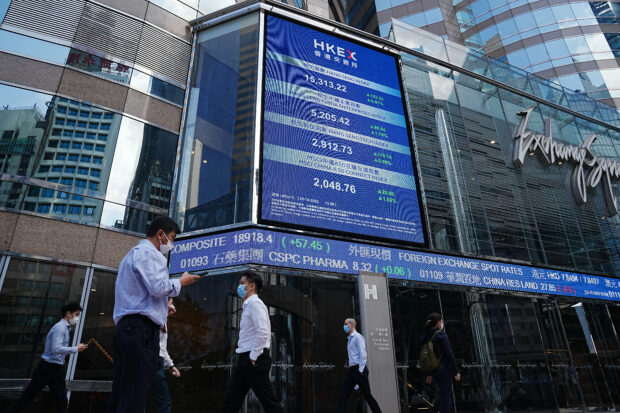Asia stocks rise ahead of US inflation data; yen stumbles

People walk past a screen displaying the Hang Seng stock index at Central district, in Hong Kong, China Oct 25, 2022. REUTERS/Lam Yik/File Photo
SINGAPORE – Asian shares inched up on Tuesday in cautious trading ahead of a crucial U.S. inflation report that could heavily influence the Federal Reserve’s policy outlook, while the fragile yen flirted with one-year lows, putting it back in the intervention zone.
MSCI’s broadest index of Asia-Pacific shares outside Japan was 0.49 percent higher, while Tokyo’s Nikkei gained 0.36 percent. Australia’s S&P/ASX 200 index was up 0.61 percent.
The Japanese yen was at 151.71 per dollar in Asian hours, having touched a one-year low of 151.92 on Monday. If the battered currency breaks below last year’s trough of 151.94, it would mark a fresh 33-year low.
Japanese Finance Minister Shunichi Suzuki said on Tuesday that the government would take all possible steps necessary to respond to currency moves, repeating his usual mantra that excessive swings were undesirable.
READ: Japan on standby to deal with ‘one-sided’ yen moves – top FX diplomat
The U.S. inflation report, due later in the day, has investors’ attention on Tuesday, especially after Federal Reserve Chair Jerome Powell and policymakers have said they are still not sure that interest rates are high enough to tame inflation.
Economists polled by Reuters expect headline U.S. consumer price inflation slowed to 3.3 percent in October from 3.7 percent in September, with the so-called core inflation rate that strips out volatile components unchanged.
“This data holds significant sway over the Federal Reserve’s future policy direction,” said Anderson Alves, a trader with ActivTrades.
“A miss, especially in the less volatile core inflation component, might lead traders to believe the Fed could refrain from further hikes. Conversely, a beat could prompt a noticeable repricing on the short-term U.S. interest curve.”
China shares were higher, with the blue-chip CSI 300 Index gaining 0.40 percent while Hong Kong’s Hang Seng Index up 0.57 percent, ahead of a summit between the top leaders from the world’s two largest economies later this week.
Benchmark 10-year Treasury yields was up 2.2 basis points at 4.654 percent, easing a touch from Monday’s one-week peak of 4.696 percent.
Moody’s cut its U.S. AAA credit rating outlook to “negative” from “stable” on Friday, citing large fiscal deficits and a decline in debt affordability. Moody’s decision comes after rival Fitch downgraded the U.S.’s top credit rating in August.
Gary Dugan, CIO at Dalma Capital, said the move underscores the significant structural challenges facing the US economy, characterized by unsustainable levels of debt and fiscal leniency.
“With the presidential election just a year away, it’s unlikely that the government will announce significant proposals to address these issues, given the unpopularity of promising spending cuts and tax increases,” Dugan said.
The U.S. faces another partial government shutdown beginning Saturday if Congress does not pass a stopgap spending bill.
Yen watch resumes
The yen’s broad decline has traders back to keeping an eye on whether the Japanese authorities will intervene. The currency is down about 14 percent against the dollar so far this year.
READ: Yen’s slide to multi-decade lows keeps markets on intervention alert
The yen had jumped briefly against the dollar in New York hours on Monday after striking the year-to-date low, which analysts attributed to a flurry of trading in options that come due this week.
Nicholas Chia, macro strategist at Standard Chartered, said the swings in yen suggests markets are nervous over intervention risks, which also does the job for the authorities to an extent by curbing excessive speculation.
Japan last intervened in the currency market – selling dollars and buying yen – in October last year. Intervention data released last month showed the authorities have steered clear of further such action since then.
The dollar index, which measures the U.S. currency against six rivals, was up 0.057 percent at 105.69. The index is down 1 percent in November, on course to snap its three-month winning streak.
Oil prices was slightly higher after an OPEC report said market fundamentals remained strong. U.S. crude rose 0.26 percent to $78.46 per barrel and Brent flat on the day.